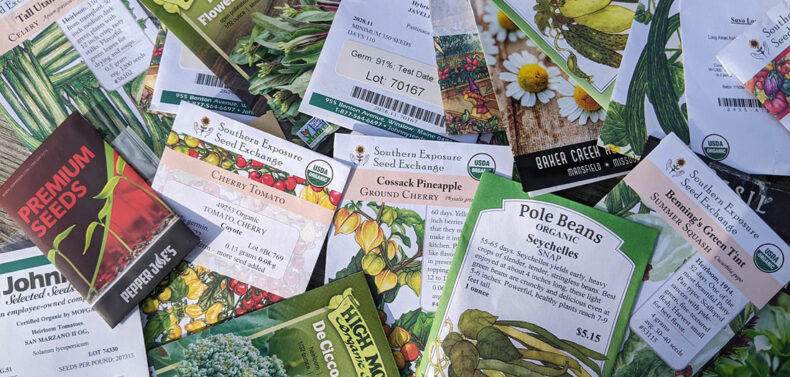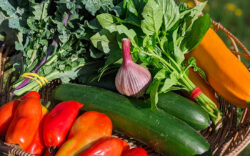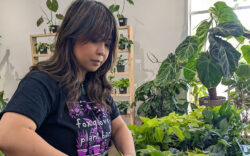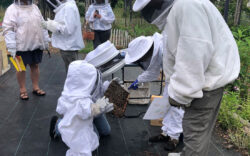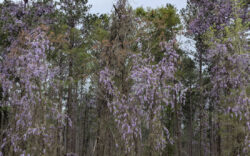Where you’ll go for seeds likely will depend on what you’re looking for and how much money you can budget for your garden this year. If you’re just picking up one or two packets, shopping in a store is fine. Otherwise, you’ll likely get more interesting seeds by shopping online.
My farm products are certified naturally grown, and according to the certification, I must purchase organic seed unless I cannot find an organic option at three other businesses. Organic seeds are pricier, but cost isn’t something I can use as a reason to not purchase organic. If you’re interested in growing organic seeds, be prepared to pay a higher price.
While you’ll likely find GMOs (genetically modified organisms) in your fast food meal, you’re not likely to find them in a seed packet. Genetically engineered seeds are almost entirely geared toward commercial conventional agriculture like corn and soybeans. However, you might want to look for and avoid any “treated” seeds. Treated seeds are more available to the home gardener, and come with a chemical coating of pesticides or fungicides. It seems wasteful to me to start covering your home-grown food in any chemicals when it’s not even germinated yet.
Finding the Cheapest Seeds
One of my perennial favorite seed purveyors, Southern Exposure Seed Exchange, touts a collection of seeds made for the heat and humidity of Northeast Georgia. There are plenty of options for tomatoes, okra and lettuce. The company also employs small farms—including some in Georgia—to grow and harvest seeds for them. This is a great way to buy worthwhile inexpensive seed stock (including organic) and support small farms at the same time.
I have not purchased seeds from MI Gardener, a gardening YouTuber who now also sells seeds. If you’re just looking for a wide selection at rock-bottom prices, this is the place to go. Most seed packets are just $2, making a big garden more affordable for folks with a strict budget.
Speciality Flavors
Kitazawa Seed Co. has a great collection of Asian greens, gourds and everything in between, with a focus on Japanese vegetables. The business also boasts Indian and African produce not found in many grocery stores. As someone who loves food from around the world, but doesn’t always know where to start, I’ve purchased a few of their seed bundles. This year, they have offerings such as a “Juicing Garden,” the “Ugly Vegetables Garden” and the “Indian Cuisine Garden.” These packets can be a great way to get started on a new cooking habit or bolster the one you already have.
I don’t buy from Seeds From Italy, but I know farmers who swear by them. The germination rates, especially for finicky types like tender greens, prove they’re worth the extra money. If you love Italian food or really fancy greens, this could be the right catalog for you.
Healthy Hybrids and Organic Options
High Mowing Organic Seeds has a great selection of winter veggies. The problem, at least for Georgians, is High Mowing’s location in Vermont. If the description of a tomato reads as “does well in heat and high humidity,” that could mean something different for the Vermonter writing it than the Georgian reading it. I worked on a farm in Vermont for three months and was shocked at the public service radio announcement reminding people to stay hydrated at 85 degrees. At 85 degrees, y’all. That being said, their winter vegetables can stand up to any wimpy cold weather the South gets.
Many farmers in the Athens area order from Johnny’s Seeds. This company sells many hybrid offerings that can outperform heirlooms. Hybrids come from purposeful, selective breeding to provide a specific benefit, such as disease or pest resistance or higher yields. However, seeds saved from a hybrid plant won’t run true—you won’t get the same type of crop again. I choose hybrids over heirlooms for plants I know suffer from specific and widespread disease, like my blight-ridden tomato plants. Heirloom varieties, such as Cherokee Purple, tend to die from blight before they can produce much more than one tomato. Hybrids like Mountain Magic boost a plant’s immunity from blight, and allow my garden to grow a full season’s worth of tomatoes.
Like what you just read? Support Flagpole by making a donation today. Every dollar you give helps fund our ongoing mission to provide Athens with quality, independent journalism.



